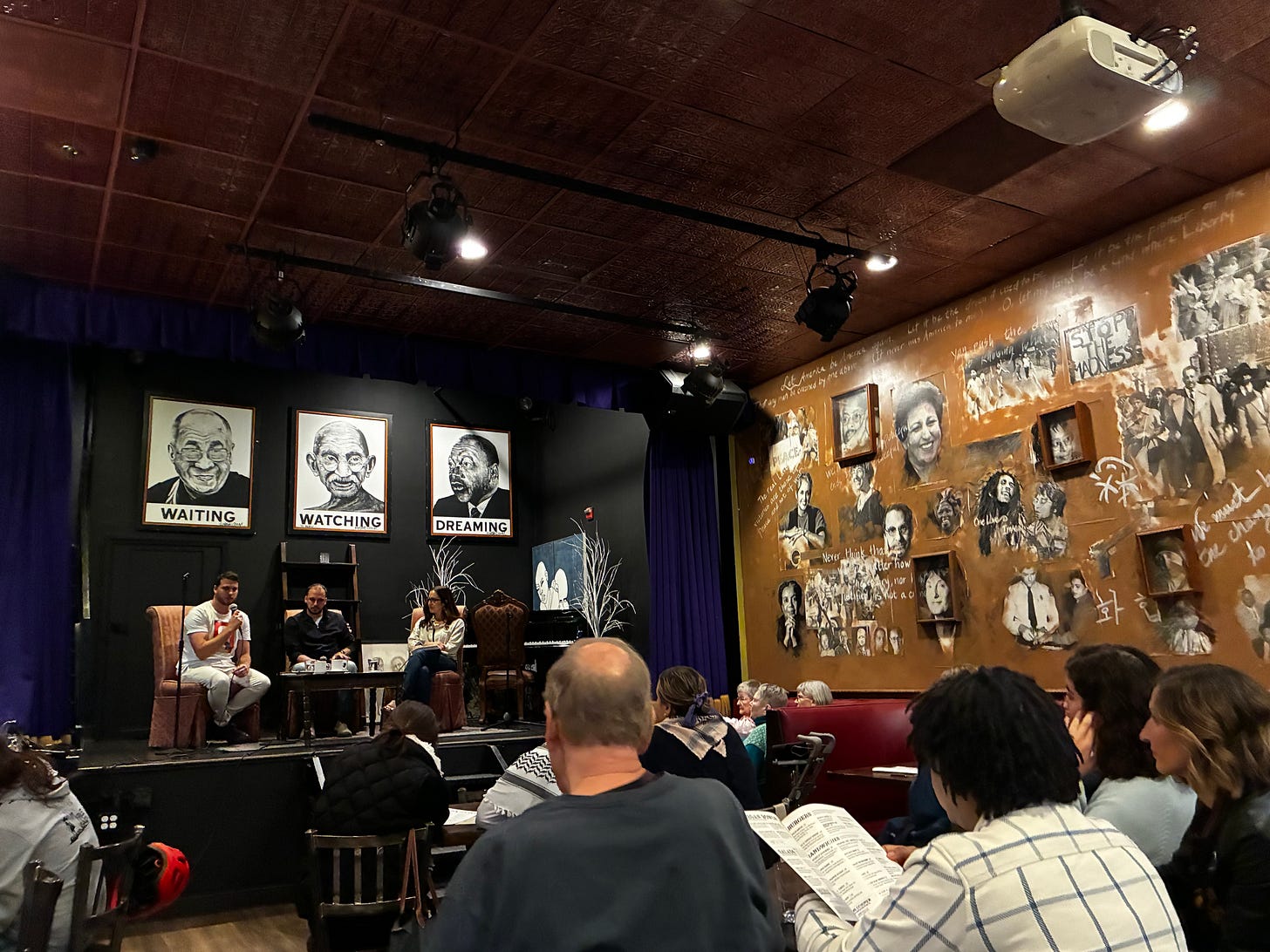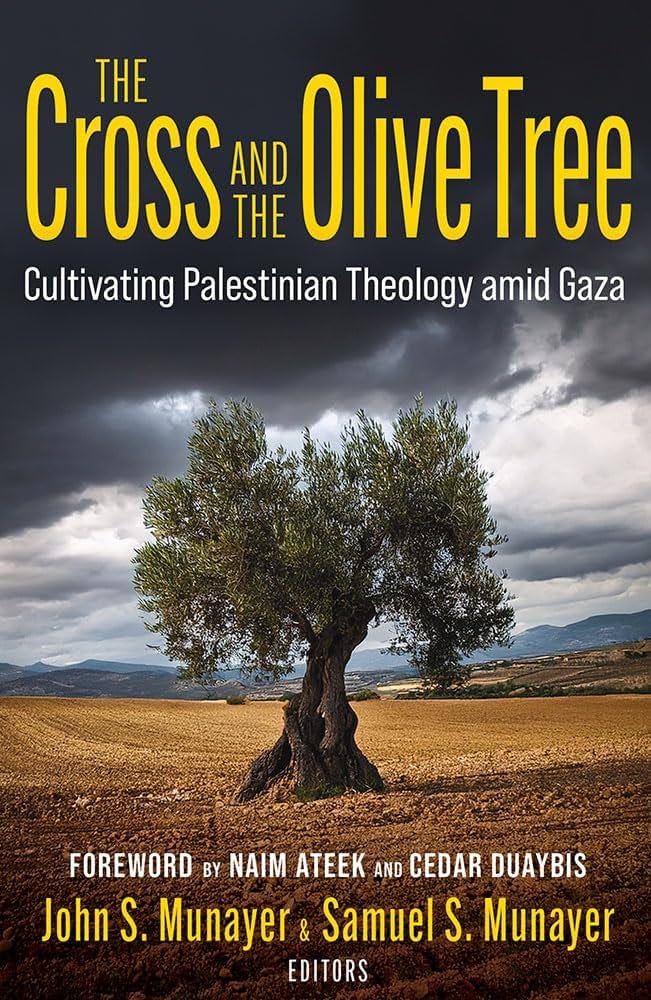What’s Next?
A ceasefire can stop the bombs, but not the moral reckoning. Will this be the start of true and just peace, or another pause before the next round of suffering?
On Monday, the “first stage” of what Trump has called “Middle East Peace” was affirmed by both him and Benjamin Netanyahu at the Knesset, Israel’s parliament, with both leaders claiming full credit. Later that day, world leaders meeting in Cairo signed on to a new peace plan.
For those of us who have long called for a ceasefire in Gaza, the West Bank, and across Israel and Palestine, this development brings gratitude and hope. The release of Israeli hostages and Palestinian prisoners has brought joy to their long-suffering families. We pray that both parties will uphold the ceasefire and that we will finally see an end to the relentless bombings that have killed tens of thousands of innocent people in Gaza—so many of them women and children. We are hopeful that, after months of mass starvation and famine in Gaza, Israel will at last allow desperately needed humanitarian aid to enter Gaza.
These first signs of peace are welcomed, but we cannot accept that peace simply means quiet skies. Ninety percent of buildings in Gaza have been reduced to rubble. The need to organize and provide resources to rebuild an entire society is urgent and overwhelming.
As the Palestinian theologian Samuel Munayer said to me yesterday while recording this week’s podcast, “a ceasefire is not peace.” Sam and his brother John are editors of the powerful and timely new book titled The Cross And The Olive Tree: Cultivating Palestinian Theology amid Gaza. I listened to their process and met both brothers in Washington, D.C. last Friday, as they were wrapping up their book tour in the U.S.. I read their book over the weekend, and I highly recommend it.
The book is a deeply faithful act of resistance and hope. It includes eight contributions from Palestinian theologians and takes a longer and deeper view than passing deadlines and political timetables. The Cross, in the title, represents their faith, and the Olive Tree stands for their rootedness in their land—an enduring symbol of resilience through devastation, as it can stand floods, winds, heat, and still survive.
In their telling, the Munayer brothers describe how olive picking brings the community together, olive oil is used in church rituals, heats lamps for light in the darkness, and famous olive soup is used as a cleanser and healer.
This book has recentered the moment we are in, and the urgent need for this fragile ceasefire to be carefully preserved and monitored. It is already being threatened by internalized violence, and a full surge of humanitarian aid is running into roadblocks. And, most importantly, there was almost no talk this week from political leaders about the very difficult process ahead to achieve genuine Middle East peace, which can only come through justice.
In all the celebrations of the first stage of the ceasefire, there was almost no mention of the Palestinian people, no talk about Palestinian sovereignty, self-governance, and flourishing. My biggest concern about this first stage is that we are already leaving the Palestinian people out of alleged peace plans.
So we must genuinely ask the questions no political leaders have so far: What’s Next? Who will comprise a policing force in Gaza to protect rights and lives in Gaza and amidst settler violence in the West Bank? Who will make sure that all the humanitarian needs for all those in need are effectively and peacefully delivered? Who will bear the enormous costs of rebuilding Gaza, and guard against the economic self-interests of outside players? Who will make sure that Hamas disarms or at least has no part in future governance of Gaza? Who will guarantee and lead the critical process of reforming and/or replacing current Palestinian leadership to oversee Gaza and the West Bank? Who will challenge the far right in Netanyahu’s government and cabinet, who are against any form of a Palestinian state or self-determination? What Israeli political leaders and parties will mobilize for the removal of Bibi Netanyahu in the 2026 elections? How can the extreme parties, in both Israel and with Hamas, who want continued war, be politically defeated?
The Cross and the Olive Tree contributors speak of “doing theology amid genocide.” The language of genocide is no longer just emotional rhetoric—it is the personal suffering of real people in Gaza at the receiving end of policies deliberately chosen by the far-right Israeli government. The definition and meaning of genocide is historical and has been named in Gaza by the International Association of Genocide Scholars (IAGS), which passed a resolution in September 2025 stating that, “Israel’s policies and actions in Gaza meet the legal definition of genocide.” Now, it is the role of the International community, especially the United States, to hold Israel and its leaders accountable for this genocide.
The Munayer brothers speak of seeing the face of God in everyone around them. The New York Times columnist, Nick Kristoff, describes, “Two peoples are fighting each other to preserve their hold on land to which they have ancient roots, and each is traumatized by the other’s violence… Whatever your view about the Middle East, we should acknowledge that an Israeli Jewish baby and a Palestinian baby are moral equivalents, each with the same right to grow up in freedom without fear of bus bombs, missiles, or ethnic cleansing.” He brings us back to the dignity of both sides. This truth—that all are created in the image of God—must be the moral foundation for any path forward.
I recall my conversations years ago in Northern Ireland, where grieving Catholic and Protestant parents, who had lost their precious children on both sides, found ways to come together in their shared sorrow and shared desire for peace. Maybe parents who have lost so much in Palestine and Israel might help lead the way forward.
Sam and John Munayer are following in the footsteps of leaders, now elders, who have gone before them. Two of them are Cedar Duaybis and my long-time friend and ally, Rev. Naim Ateek, co-founders of Sabeel in Jerusalem, who co-authored the book’s foreword, which reads:
“Indeed, we find in these authors an inextinguishable hope that inspires the reader to believe that justice, peace, and reconciliation are achievable and that Christ’s victory over the powers of evil and injustice can illuminate our path as we continue to strive for a future where all the people of our land can live in dignity, equality, and harmony. Life is stronger than death. Resurrection and a new life of love and compassion are more enduring than injustice, bigotry, and domination.”
Amen.




My thought is that unfortunately Donald Trump's only goal was to obtain a cease fire and cease of the war between Israel and Hamas as soon as he could to try to obtain the Nobel Prize for Peace, which was ludicrous to say the least. Now that the cease fire is "obtained" and the Nobel Peace Prize was awarded to Maria Corina Machado, Donald Trump has no more interest in working with anyone towards rebuilding Gaza or Israel - he is back on to other ways of destroying the rights and needs of the people in America.
Thanks, Jim for your thoughtful, cogent, and honest reflection. Your insights and recommended readings bring a glimmer of light and hope to this awful situation.